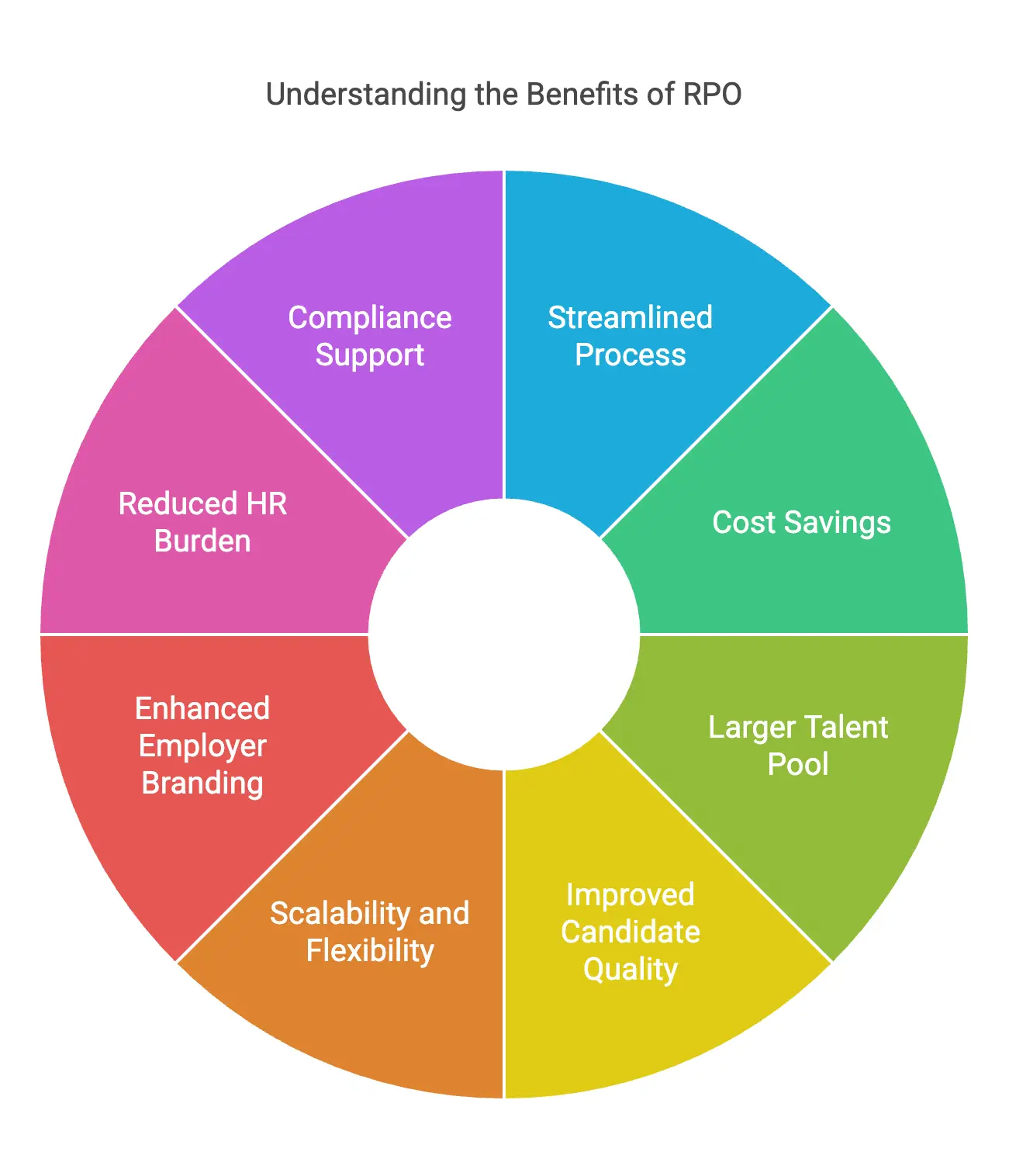Recruitment Process Outsourcing (RPO) offers numerous benefits, making it an attractive solution for businesses facing recruitment challenges. It streamlines the hiring process by leveraging the expertise, technology, and networks of specialized providers, resulting in faster and more efficient talent acquisition. RPO reduces recruitment costs by cutting expenses related to advertising, screening, and maintaining in-house hiring teams while improving the quality of hires through advanced sourcing techniques. It also provides scalability, allowing businesses to adapt to fluctuating hiring demands, and alleviates the burden on internal HR teams, enabling them to focus on strategic tasks.
Business owners choose RPO to solve problems like high recruitment costs, inefficient processes, limited access to talent pools, and compliance complexities, ultimately enhancing productivity and achieving better hiring outcomes.
With Go Carpathian, business owners can tap into the world of global talent and get matched with previously vetted candidates. Schedule a talk with a recruitment specialist to find out how Go Carpathian can help your business reduce hiring costs while outsourcing to high-quality candidates in Eastern Europe, South Africa, and Latin America
In this article, we will explain what is RPO, how it works, what are the benefits and types of RPO, how much does it cost to use RPO, and how to choose the right RPO partner.
What Is Recruitment Process Outsourcing
RPO is a strategic approach where an organization transfers part or all of its recruitment functions to an external service provider. RPO providers act as an extension of the company’s HR team, handling tasks such as job profiling, candidate sourcing, screening, interviewing, and onboarding. This model leverages the expertise, technology, and resources of specialized firms to improve the quality of hires, accelerate the recruitment process, and reduce costs. RPO is highly flexible and scalable, allowing businesses to adapt their talent acquisition strategies based on changing needs while focusing on core operations.
How RPO Works
RPO works by transferring all or part of an organization’s recruitment processes to an external provider. This provider acts as an extension of the organization, managing tasks such as assessing hiring needs, creating job descriptions, talent research, candidate screening, interviewing, and onboarding. The RPO model is flexible and can be tailored to fit specific business needs, offering full, project-based, hybrid, or on-demand services. RPO providers leverage advanced recruitment technology and industry expertise to streamline hiring processes, reduce costs, and improve the quality of hires. They also handle strategic development, implementation, and ongoing evaluation of recruitment processes to ensure alignment with organizational goals. By outsourcing recruitment, businesses can focus on core operations while benefiting from specialized talent acquisition services.
8 Benefits of RPO
Recruitment Process Outsourcing offers several significant benefits that address common recruitment challenges for businesses:
- Streamlined Recruitment Process: RPO providers manage the entire hiring process, using proven methodologies and advanced technology to eliminate inefficiencies and ensure consistency, making recruitment faster and more effective.
- Cost Savings: By outsourcing recruitment, businesses reduce expenses related to advertising, screening, interviewing, and maintaining in-house hiring teams. RPO providers optimize processes to minimize costs while ensuring high-quality hires.
- Access to a Larger Talent Pool: RPO firms have extensive networks and sourcing expertise, enabling them to identify and attract top talent, including hard-to-find candidates with specialized skills.
- Improved Candidate Quality: Leveraging advanced screening tools and expertise, RPO providers ensure that only the most qualified candidates are selected, improving overall hiring outcomes.
- Scalability and Flexibility: RPO services allow businesses to scale recruitment efforts up or down based on changing needs without the burden of maintaining permanent internal resources.
- Enhanced Employer Branding: RPO providers help improve an organization’s reputation as an employer by creating a positive candidate experience and aligning recruitment strategies with the company’s values.
- Reduced Burden on HR Teams: By handling time-consuming recruitment tasks, RPO frees up internal HR teams to focus on strategic initiatives like employee development and retention.
- Compliance Support: RPO providers stay updated on labor laws and regulations, ensuring that recruitment practices remain compliant across different regions.
Types of RPO
RPO comes in several forms, each tailored to meet specific organizational needs:
End-to-end or Enterprise RPO
This model involves outsourcing the entire recruitment process, from job profiling to onboarding. It is ideal for companies seeking comprehensive management of their hiring functions, aiming to enhance operational efficiencies and improve candidate quality.
Project-based RPO
Suitable for specific recruitment projects, such as scaling a new department or managing seasonal hiring. It provides specialized resources for a defined period to meet immediate hiring needs.
On-demand RPO (FlexRPO)
Offers flexible recruitment support on an as-needed basis, perfect for companies with fluctuating hiring demands. It scales up or down quickly without long-term commitments.
Hybrid RPO
Combines in-house and outsourced recruitment functions to create a customized solution. This model allows businesses to outsource specific parts of the recruitment process while maintaining control over others.
Function-based RPO
Focuses on specific functions within the recruitment process, such as sourcing, screening, or recruitment marketing. It supplements internal recruitment teams where needed.
Recruiter on-demand (ROD)
Provides experienced recruiters on a short-term basis to handle immediate hiring needs, quickly integrating into the existing recruitment team.
Total Talent (RPO + MSP)
Combines RPO with Managed Service Provider (MSP) solutions to manage both permanent and contingent workforce hiring processes.
How Much Does RPO Cost
The cost of RPO varies based on several factors, including the scope of services, hiring volume, job complexity, and pricing models. Here are the common pricing models and factors influencing
Pricing Models
RPO pricing models include Management Fee, which charges a fixed monthly fee for ongoing recruitment management; Cost Per Hire, where fees are based on each successful hire; Pay-for-Performance, tying costs to hiring outcomes; Fixed Fee, offering a set price for the entire process; and Hybrid Models, combining elements like a management fee plus per-hire costs for flexibility and scalability.
- Management Fee (Fixed Fee Model): A monthly retainer for comprehensive recruitment management. This model is often used for enterprise RPO services and provides a predictable cost structure.
- Cost Per Hire: A fee charged for each successful hire, typically varying by job type and industry. This model is suitable for short-term or project-based hiring needs.
- Hybrid Model: Combines a fixed management fee with a cost-per-hire or performance-based component. It offers flexibility and scalability, making it suitable for businesses with fluctuating hiring demands.
- Cost Per Slate: The RPO provider delivers a list of qualified candidates, and the client pays for each slate regardless of hires made.
- Cost Per Transaction: Fees are charged for specific recruitment process steps, such as screening or interviewing.
Factors Influencing Costs
Factors influencing RPO costs include hiring volume, where higher volumes reduce per-hire costs through economies of scale, complexity of roles, with specialized or senior positions requiring more resources and expertise, geographic location, and other factors we will explain here:
Scope of Services
Whether the RPO provider manages the entire recruitment process or just specific parts affects costs.
Hiring Volume
High-volume hiring can lead to economies of scale, reducing per-hire costs.
Job Complexity & Location
Specialized roles or remote locations may increase costs due to additional logistics and expertise required.
Technology & Compliance
Integration of technology and compliance requirements can impact pricing.
Need a Partner in Outsourcing?
RPO and general outsourcing offer numerous benefits for business owners, including cost savings by reducing overhead and labor expenses, improved efficiency by delegating non-core tasks to specialized experts, and access to a broader talent pool with advanced skills and technology. These strategies enhance scalability, allowing businesses to adapt quickly to changing demands, while also ensuring compliance with regulations and reducing administrative burdens. By outsourcing, business owners can focus on strategic growth initiatives, improve productivity, and streamline operations, ultimately fostering better customer satisfaction and long-term success.
Interested in outsourcing your work overseas? Schedule a Discovery Call and learn how you can hire high-quality professionals while reducing hiring costs.






